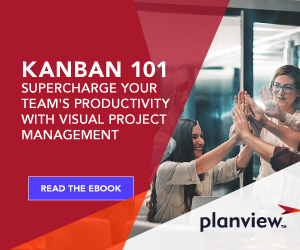
In March, SolutionsIQ included us in their article, “Getting to Equal in an Agile Workplace,” as one of the tools that can help teams achieve transparency while tracking the progress of their work. Throughout the article, author Hanna Gnann offered a fresh take on how companies can strive to achieve equality for women in the workplace using an agile mindset.
At Planview, we’ve had the pleasure to work with many incredible women who are working, managing, teaching, and leading in the Lean and Agile space. In this three-part blog series, we’ll highlight some of these women and have a candid conversation about how they got started in Lean, how it impacts their work and leadership, and what advice they have for others getting started.
In part one, we spoke with Julia Wester, co-founder and principal consultant of Lagom Solutions. Julia has 17 years of experience working in and managing teams at Turner Broadcasting, F5 Networks and Planview AgilePlace, and has been working in Lean since 2009. Julia is passionate about teaching others how to tame the chaos of everyday work by embracing transparency, continuous improvement and a lagom mindset, as well as talking about how management doesn’t have to be a dirty word.
WHEN DID YOU FIRST START WORKING WITH A LEAN APPROACH?
I started using Kanban in 2009 when I started my management career. I needed a way of thinking and working that helped my team finish work. I managed a team full of really smart developers that were working really hard but not delivering anything to our stakeholders. It wasn’t an ideal situation. Finding Kanban was the door to learning about the wider world of Lean and the benefits therein.
WHAT ARE THE BENEFITS OF LEAN?
I tell people that I help others get more done with less stress—that I help them remove unnecessary drama from their workdays. I think, in a nutshell, that’s what Lean can do. Lean fosters learning. It can help you see how you work and teach you how to improve the processes (aka problem solving skills). When you have a bunch of people with problem solving skills, then you really can be unstoppable.
HOW HAS LEAN IMPACTED THE WAY YOU WORK?
It’s been such a journey that it’s hard to remember back to before I knew about Lean! I would say that the biggest change was moving from knee-jerk, reactive tactics with no measurement to intentional, thoughtful experiments where I gather results and use them to inform future decisions.
HOW HAS LEAN IMPACTED YOU AS A LEADER?
I definitely don’t expect people to perform superhuman feats to get things done in impossible timelines. Lean has given me the backing of theory and knowledge to drive companies to live within their means. If you don’t like the means, see what you can do to change them.
HOW HAS LEAN THINKING IMPACTED YOUR TEAM AND/OR COMPANY’S CULTURE?
There is definitely more of a focus on outcomes for the team/dept/org than on individual productivity. We are very cognizant about the impacts of what we measure – what behaviors those will cause and whether or not that will further, or detract from, achievement of our goals.We are careful to protect the psychological safety of everyone on the team so that they don’t have to focus on protecting themselves, but, rather, can focus on doing their work the very best they can.
DO YOU THINK WOMEN CAN THRIVE IN LEAN CULTURES?
The Lean workplace is all about sustainability. This means thriving during the workday but not burning yourself out – giving yourself time to take care of your family… they are probably why you’re working in the first place. This is good news for anyone with responsibilities outside of the office. Fortunately we’re seeing more equity amongst fathers staying at home when there’s a one income household, but historically, in the US at least, that pressure has been put on the mother. Now, there’s less pressure to work 24/7 and have to choose between families with children and work. That’s good news for women.
WHERE DO YOU GO TO LEARN MORE ABOUT LEAN?
I have been going to LeanAgile Scotland and LeanAgile US for a few years now and have really enjoyed those conferences. I also attend many DevOps conferences. DevOps incorporates Lean, which encourages you to look at the end-to-end system. In fact, DevOps is systems thinking tailored to tech problems, but now its branching out, realizing that you have to look at the whole system. The first “way” of DevOps is Flow. I also read books – too many to list, but a few favorites are:
- This is Lean by Niklas Modig
- Kanban Change Leadership by Klaus Leopold (and others)
- Making Work Visible by Dominica DeGrandis
- Managing to Learn by John Shook
- The Phoenix Project by Gene Kim
- Kevin Behr
- George Spafford
- The Goal by Eli Goldratt
WHAT ADVICE WOULD YOU GIVE TO OTHERS GETTING STARTED IN LEAN?
Find others online and start making connections, build a supportive group that will be there for you as you try out new things. Read (a lot) – or watch videos. It’s ok to do something the way someone else did it if you are keeping an eye open so you can change it when it doesn’t fit your context quite right. (All models are wrong, but most are useful). Biggest piece of advice… start recording results from the beginning. See the difference (in data!) You are creating your story from day 1. If you don’t capture it, no one else will and your memory will not be as good later on!
Julia Wester is a Web Developer turned Manager turned Lean Consultant and Kanbanista. Passions include helping people visualize and manage their work, showing that management doesn’t have to be a dirty word, and helping people remove unnecessary drama at work. Julia is co-founder of Lagom Solutions. Connect with Julia on Twitter @everydaykanban.

![A Global Collaborative Work Management Blueprint [Video]](https://blog.planview.com/wp-content/uploads/2019/07/A-Global-Collaborative-Work-management-blueprint.png)


